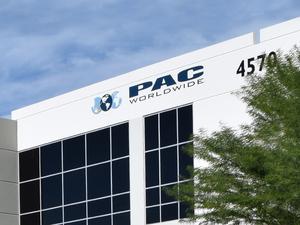
As investors pull back from technology industry, employee layoffs may start to become more common in Atlanta's startup ecosystem.
Last year was a different story. Company valuations increased and valuations grew up to five times more than what they would have been previously. But in recent months, company valuations have been reset, going down as much as 70%. Companies struggling to raise their valuations may look for ways to cut costs internally, which includes slashing people from the payroll.
Atlanta startup Terminus and Sonar Software, once recognized for their considerable growth, are both laying off employees.
For Onwards HR CEO Sarah J. Rodehorst, the key to making layoffs is consistency.
"The most important aspect of all is to treat people fairly during the process," Rodehorst said.
Atlanta's Onwards HR helps companies automate and navigate employee layoffs. To date, the company has helped generate 1,900 severance packages and managed over 1,000 furloughs, according to its website.
Rodehorst talked to Atlanta Inno about what startups need to know before making cuts.
Many companies that will begin to make layoffs were founded a few years back. This will be their first time making a cycle of layoffs. What are some of the biggest mistakes companies make the first time around?
It’s all about making sure the exit experience is positive for the employee. A lot of times when there is a layoff, a company wants to provide benefits to ease the transition for the employee to go back into the job market, so they’ll offer severance based on tenure, their role and their salary. It’s about making sure the severance policy is robust enough to help employees. There's a lot of mistakes that could apply to that process. A few years back, Microsoft laid off 1,400 people and overpaid every one of those employees. Companies should apply their severance policies consistently across all employees to make sure that it's accurate.
Another mistake as part of the exit process is making sure the separation agreements are accurate and align with state regulations. With Covid-19, one nuance is that startups now have a big pool of remote workers, and they are across the U.S. So when you look at an employee’s separation agreement, it's actually based on where they live. So California, for example, has a lot of rules that just apply to its own residents. It’s also important to make sure there isn't any bias when looking at people who have been selected to be let go and considered to stay on, whether for gender, age, disability or race.
Any specific corporate policies, union rules and employment laws when employees are let go due to these types of circumstances?
Anytime a company does a layoff, they have to have a business justification and a selection criteria. One of those justifications can be reducing costs to preserve the company. A lot of these companies have grown too fast and just didn't have the revenue they were expecting. They have found themselves upside down with more staff than work needed to be done. When you get into looking at who is terminated, that's where it gets more sensitive, and there are different selection criteria. One is skill-based. So you could look at people with skills you need and seeking to retain those skills. Then there's also tenure. There's a concept of last in, first out.
If a company is forced to make layoffs because they “grew too fast," it can certainly hurt their reputation. What’s the best way for them to avoid that?
First thing we recommend is to not do layoffs. One way to get ahead of that is to be realistic about their revenue forecasts and what the needs of the company are. Then they should be looking at their hiring practices to not get ahead of themselves. Unfortunately, that’s not something that can always happen. We were just in growth mode where everything was rainbows and unicorns, and it just ended up putting companies in a difficult spot. Companies should always be looking ahead, but now it's about how they manage the situation they’re in to preserve the company.
Because these layoffs are a result of rapid growth last year, many of these employees who are getting laid off were hired just a few months ago. Does that make the exit process anymore difficult?
CEOs need to be thoughtful of how to do their layoff process because as much it's about making sure there is a smooth transition, it's also about those employees still at the company who are watching how the leadership is treating those people. Traditionally, companies haven't offered severance for employees who have only been there a few months. What we’re seeing now is that they are changing that policy and offering severance to every employee. Leadership knows they may have made poor decisions to hire so fast and are trying to correct that. Not only does that help those employees, it also helps retain employees they have, because they see they are being treated with respect in regards to that exit process.
Is there a strong likelihood that these employees could be hired again by the same company?
It's one of the reasons that we make sure companies do try to make it as positive as possible because rehiring people is very likely. They want to retain top talent. A lot of the employees who are notified oftentimes get placed in open positions in other areas within the same organization. We support that as part of the exit process because it is so hard to take someone who is brand new, train them, just to lay them off. Rather, if a company can take an employee that already knows all of that and transition them to a new role, that company will retain that top talent as well and save time and money during that sort of ramp up period for a new rehire.







